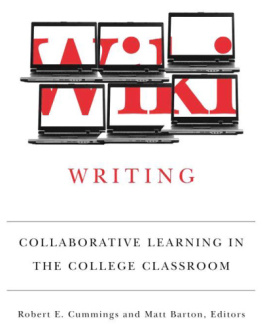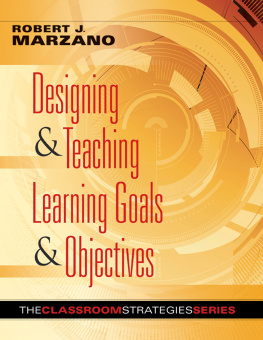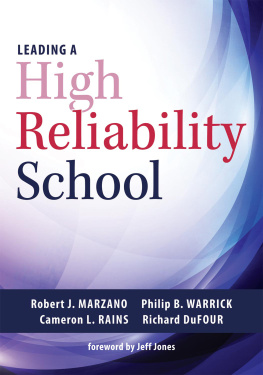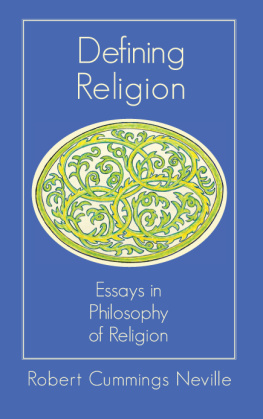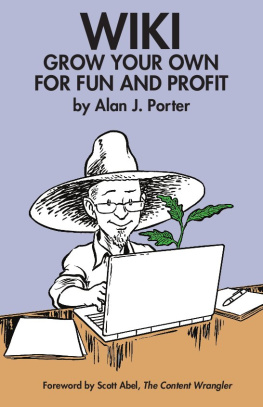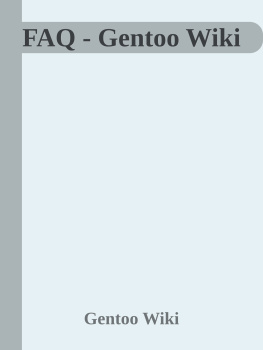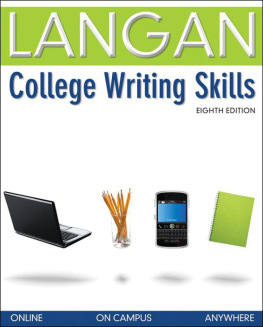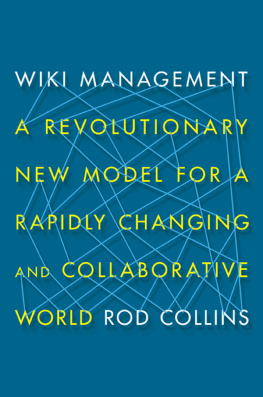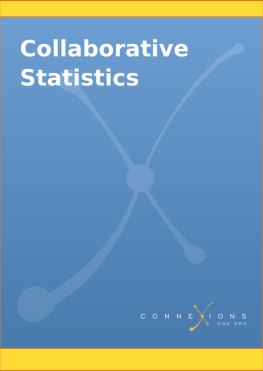Cummings Robert E. - Wiki Writing: Collaborative Learning in the College Classroom
Here you can read online Cummings Robert E. - Wiki Writing: Collaborative Learning in the College Classroom full text of the book (entire story) in english for free. Download pdf and epub, get meaning, cover and reviews about this ebook. year: 2018, publisher: University of Michigan Press and University of Michigan Library, genre: Romance novel. Description of the work, (preface) as well as reviews are available. Best literature library LitArk.com created for fans of good reading and offers a wide selection of genres:
Romance novel
Science fiction
Adventure
Detective
Science
History
Home and family
Prose
Art
Politics
Computer
Non-fiction
Religion
Business
Children
Humor
Choose a favorite category and find really read worthwhile books. Enjoy immersion in the world of imagination, feel the emotions of the characters or learn something new for yourself, make an fascinating discovery.
- Book:Wiki Writing: Collaborative Learning in the College Classroom
- Author:
- Publisher:University of Michigan Press and University of Michigan Library
- Genre:
- Year:2018
- Rating:3 / 5
- Favourites:Add to favourites
- Your mark:
- 60
- 1
- 2
- 3
- 4
- 5
Wiki Writing: Collaborative Learning in the College Classroom: summary, description and annotation
We offer to read an annotation, description, summary or preface (depends on what the author of the book "Wiki Writing: Collaborative Learning in the College Classroom" wrote himself). If you haven't found the necessary information about the book — write in the comments, we will try to find it.
Wiki Writing: Collaborative Learning in the College Classroom — read online for free the complete book (whole text) full work
Below is the text of the book, divided by pages. System saving the place of the last page read, allows you to conveniently read the book "Wiki Writing: Collaborative Learning in the College Classroom" online for free, without having to search again every time where you left off. Put a bookmark, and you can go to the page where you finished reading at any time.
Font size:
Interval:
Bookmark:

Collaborative Learning in the College Classroom
Edited by Robert E. Cummings and Matt Barton
THE UNIVERSITY OF MICHIGAN PRESS AND
THE UNIVERSITY OF MICHIGAN LIBRARY
ANN ARBOR
Copyright by Robert E. Cummings and Matt Barton 2008
All rights reserved
Published in the United States of America by
The University of Michigan Press and
The University of Michigan Library
Manufactured in the United States of America Printed on acid-free paper
Printed on acid-free paper
2011 2010 2009 2008 4 3 2 1
No part of this publication may be reproduced, stored in a retrieval system, or transmitted in any form or by any means, electronic, mechanical, or otherwise, without the written permission of the publisher.
A CIP catalog record for this book is available from the British Library.
Library of Congress Cataloging-in-Publication Data
Wiki writing : collaborative learning in the college classroom / edited by Robert E. Cummings and Matt Barton.
p. cm.
Includes bibliographical references and index.
ISBN-13: 978-0-472-11671-3 (cloth : alk. paper)
ISBN-10: 0-472-11671-1 (cloth : alk. paper)
1. English languageRhetoricStudy and teaching (Higher) 2. Academic writingStudy and teaching (Higher) 3. Internet publishing. 4. User-generated content. I. Cummings, Robert E., 1967 II. Barton, Matt.
PE1404.W533 2008
808'.0420711dc22 2008032084
ISBN-13: 978-0-472-02224-3 (electronic)
for ECS REC
for Elizabeth Barton MDB
Matt Barton and Robert E. Cummings
Wiki Writing: Collaborative Learning in the College Classroom is, as the title suggests, an exploration by teachers in higher education of the online writing spaces called wikis. How do wikis change student writing and collaboration? The answer lies in the way they structurally invite collaboration and yet tolerate dissension. Wikis are not blogs or Web spaces where one user writes and all others read. Similarly, wikis are not forums or messaging boards where users post multiple statements in a hierarchical chain. Because wikis allow all readers to write (typicallythere are important exceptions), but write the same document, they provide a unique Web space where differing opinions are expressed, explored, and, yes, sometimes eviscerated, but gradually moved toward consensus. If wikis do not foster complete consensus, they facilitate a defined disagreement. But as these spaces create communities of inquiry around topics, they facilitate a gradual move toward a more singular comprehension of the state of knowledge for that community topic. The content on wikis will differ greatly from one community to the next. But it is the underlying commonality of that shared site space, the wiki itself, that moves users from complete divergence of opinion toward often greater understanding through dialogue.
Wikisand specifically the clashes surrounding that most famous wiki, Wikipediahave evoked what some might term intellectual lawlessness. As wikis emphasize diversity of expression on a massive scale, creativity and originality erupt in spaces beyond official endorsement or review. Similarly, fraud, character assassination, hoax, and simple hyperbole thrive in this uneven landscape. For a Web that seemed to promise so much in terms of diversity of points of view in the late 1990s, too much territory has been worn bare with familiar paths. Wikis represent a proximal negotiation between community and individual on the Web: a way for the individual (one) to work in dialogue with a community of inquiry (one) dedicated to a particular topic or mode of inquiry.
Page viiiWikis are often simplistically described as Web sites that anyone can edit and seem to many people to represent nothing but textual chaos. As Robert E. Cummings explores more fully in his introductory essay to this volume, there is a difference to appreciate between wikis generally and Wikipedia singularly. But a glance through that most famous wiki, Wikipedia, would reveal tens of thousands of entries that are well written, lavishly researched, and probably more up-to-date than any printed encyclopedia. Whenever Wikipedia is mentioned in the popular press, however, it is almost always in conjunction with some abuse of the system or scandal, such as when a politician or CEO is discovered to be creating or spinning his or her own pages.
Meanwhile, flocks of zealots settle down on controversial pages and exercise brute force in an effort to keep their pages biased in their favor. Concerned scholars, scientists, and educators make corrections to pages that are later overturned, while other contributions are rejected for being original research. Shouldn't there be some kind of system in place to privilege contributions from experts?
Many of the most successful wiki communities emulate an encyclopedia format. One of the better-known examples of these is Wikitravel, an open source travel guide. As of this writing, users have contributed 16,313 destination guides and articles of interest to world travelers. Another well-populated wiki community is Memory Alpha, a wiki dedicated to all things Star Trek. That project currently boasts 25,953 articles. We also find businesses turning to wikis to collaborate with customers in building help sites and guides for their products or services. Companies that have jumped on the wiki bandwagon include Amazon, eBay, Intel, and Symantec.
Amazon's project is called Amapedia, which encourages users to write about their favorite products. The articles typically describe the product in question, list similar items, and place the item in a network of related content (such as larger categories or genres). The Amapedia is integrated with Amazon's product database, so an article titled Real-Time Strategy Games may include dozens (if not hundreds) of links to other such games sold at Amazon. The idea seems to be that customers will buy more products if they are better informed.
eBay uses wikis to help its customers understand online auctions. A good example is a page called For Buyers: Protecting Yourself Against Fraud. The page appears to be authored by individuals who have firsthand experience Page ix with criminal activity on the popular online auction site. The Intel Software Network wiki is intended for users who want to share their hands-on knowledge about Intel's products with other professionals. Symantec uses wikis internally to help its employees track ideas and collaborate. A company named QAD, which provides enterprise software to large manufacturing companies, uses wikis to facilitate the sales proposal process. QAD's customers work with the company to collaborate on proposals, speeding up the process from up to a month to just days and providing much more satisfying service.
Wikis have also attracted the interest of many professional educators all over the world. These educators not only are motivated to analyze wikis from a theoretical perspective but also want to understand how and why their students should invest in them. What can writing in a wiki teach students about the composition process? What kind of rhetoric is needed to successfully enter and actively participate in a wiki community? What are the different stages of collaboration, and how do they foster course outcomes? And, on a more pragmatic level, what kind of wiki-related writing assignments will truly benefit students? If wikis are good for anything in a writing classroom, it is their ability to open up issues that may have seemed hopelessly abstract before. Postmodern theory has, for example, been waxing on for decades about how we should question our Romantic notions of authors and authority. Wikis demonstrate the problem quite concretely by conflating the roles of author and audience. Likewise, what were once puzzling and baffling discussions about the role of expertise in knowledge production, such as how much we should privilege expert or official knowledge over the wisdom of crowds, are now vivid and concrete, immediately accessible. Some dream of daily newspapers published as citizen wikis; there is even an effort to build virtual universities in wikis, and plenty of professors have worked together to create free college wikitexts. Even if these projects ultimately fail, the social, cultural, and technological milieu that led to their existence is a rich and fertile ground for scholars. Far more than some new hip technology, the wiki phenomenon promises to provide fundamental and important insights into the nature of knowledge production itself.
Font size:
Interval:
Bookmark:
Similar books «Wiki Writing: Collaborative Learning in the College Classroom»
Look at similar books to Wiki Writing: Collaborative Learning in the College Classroom. We have selected literature similar in name and meaning in the hope of providing readers with more options to find new, interesting, not yet read works.
Discussion, reviews of the book Wiki Writing: Collaborative Learning in the College Classroom and just readers' own opinions. Leave your comments, write what you think about the work, its meaning or the main characters. Specify what exactly you liked and what you didn't like, and why you think so.

